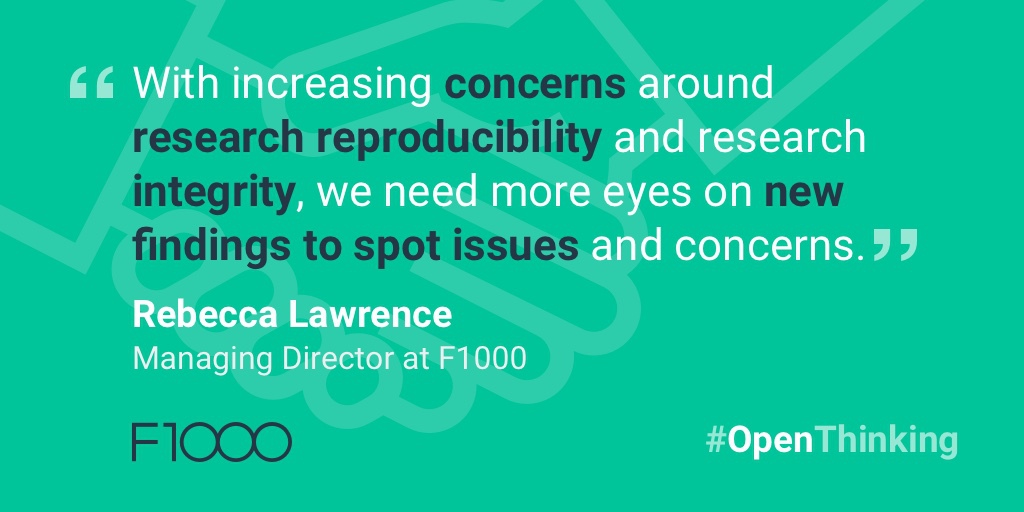
Do research integrity and peer review go hand in hand? A perspective for Peer Review Week
The UK Research and Innovation organization defines research culture as “Research carried out with a high level of integrity upholds values of honesty, rigor, transparency and open communication, as well as care and respect for those involved in research and accountability for a positive research environment.” As publishers, we have a responsibility to uphold the scientific integrity of research by making sure all the research we publish follows these principles.
This year’s Peer Review Week theme perfectly aligns with this, focusing on ‘Research Integrity: Creating and supporting trust in research.’ With new global crises on our hands, including climate change, the coronavirus pandemic and now monkeypox, trust-worthy peer review is arguably more important now than ever before. Scientists need research they can trust. We need to have confidence in our reviewers and publishers, and we rely on their expert opinions to assess the quality and validity of the published research.
“Transparency is the key to research integrity. Transparency and detail in research methods and protocols, in the open sharing of underlying research data, and then in the methods and tools/code used for the analysis that lead to the conclusions. Furthermore we need to remove the barriers and consequently biases in which findings are communicated and shared with others. By having all this information available enables much more rigorous assessment by peer experts, whether invited or from the broader collective research community, so that errors or problems (either by mistake or deliberate) can be identified quickly to ensure greater integrity and validity of the research that we then build on with the next discoveries.”
Rebecca Lawrence, Managing Director at F1000.
At F1000, we believe that transparency in the peer review process is a hallmark for quality and accountability, making it easier to know if research can be trusted by bringing intellectual rigor and challenge to the research community. In particular, open peer review offers the academic community an opportunity, not just to transparently test arguments, but to better understand others’ viewpoints, contribute to the debate, and lead by example as to how research can productively be discussed and examined in the public realm.
“Integrity, trust and understanding in peer review can be achieved through transparency. Authors should ensure their work adheres to open research practices so that reviewers have the information necessary to make a complete, independent assessment. Reviewers should reciprocate this openness by signing their reports and engaging in an open dialogue that provides constructive criticism.”
Michael Markie, Publishing Director at F1000.
Open peer review is the key to tackling public health misinformation

A few months ago, Rebecca discussed why an open peer review model is key to tackling public health information in a Times Higher Education blog. There are several reasons why this enables accountability for science and public confidence, such as:
- Building trust in the research as the public can see who has reviewed the findings before using it themselves
- Enhances the research process by contributing to productive discussions and debate
- Greater visibility of the research can help spot issues or concerns early on
At F1000, we are proud to be the first publisher to offer a fully open and transparent post-publication peer review process. This innovative open model has helped lead the way for the scholarly community to start embracing a transparent and accessible research process.
However, peer review cannot happen without reviewers – they have the vital role of assessing the quality and validity of the research. It is therefore important to recognize and reward the work of reviewers, something which isn’t possible in a traditional, closed peer review process. With F1000, reviewer names and affiliations are published openly alongside the full peer review report, allowing their contribution to be formally acknowledged. Additionally, our editorial team are checking each report thoroughly against our criteria for quality, ensuring it meets our Code of Conduct and is adhering to the core research integrity principles.
The future of peer review
“I truly believe that the future of peer review, and on a wider scale the future of publishing, lies with open and transparent practices. While not a panacea, they bring the remaining problems with publishing and academia into the light so they can be properly challenged, rather than in the traditional systems where many outside of the ecosystem simply aren’t aware of their existence or extent!
“As technology advances I also think this will become a larger and larger part of the peer review process; however, it should be used to support human validation, not replace it. Whether it’s plagiarism checks, statistical validation, reference consistency, or the myriad of other things that reviewers are often asked to evaluate, these can and should be automated and assessed before an article is sent to reviewers so that they are free to focus where their true expertise lies: the academic content of the article. This not only improves the speed and reviewer experience of the process, but also allows for more rigorous, objective, and consistent quality and ethics checks, therefore creating a more robust and trustworthy publishing system.“
Eleanor-Rose Papas, Senior Editorial Operations & Peer Review Manager at F1000.
The world of peer review, whether open, closed or everything in-between, can progress at different speeds depending on the subject field. Daniel Hunt, Editorial Assistant at F1000, explains the difference in peer review between Arts, Humanities, and Social Science (AHSS) and Science, Technology, Engineering and Mathematics (STEM):
“AHSS disciplines are in crisis. From funding cuts and fake news to disciplinary politics and hoax articles, confidence in the integrity of AHSS research has collapsed among both academics and the public. Closed peer review, the traditional safeguard of research integrity, has never been completely trusted by AHSS researchers or understood by the general public. Open peer review has the potential however to change this.
“We can rebuild trust by recognizing the diversity of voices and plurality of opinions and experiences that makes the humanities and society at large so rich and compelling. By breaking down traditional barriers and rethinking the role of a peer reviewer, we can build a new, open, productive, collaborative review process recognizing different definitions of quality and significance, whilst raising the standard of research and safeguarding its integrity. Broadening access to, and engagement with, the review process can foster a renewed understanding of the role AHSS research plays in changing minds about meaning and values.
“This change, however, must come from the humanities. Academic publishing has for the most part been built by STEM for STEM. AHSS researchers and publishers must be bold in their pursuit of a new settlement. One that conforms to agreed standards of rigor and integrity, but does not stifle the complex, fragmented and beautifully messy practice of humanistic research.
“The future of peer review is open. The future of the humanities is open. But the meaning of open peer review in the humanities is a conversation we need to be having now.”
Next steps
As we know, research is often used to inform public policy, assist future research, and enable better development of treatments and technologies. As a responsible member of the scholarly community, F1000 will continue to uphold research integrity by publishing research of the highest standard and by ensuring our open peer review process is credible and trustworthy.
If you are interested in learning more, don’t miss the upcoming Westminster Higher Education Forum on “The next steps for research integrity and reproducibility” taking place on November 24th, featuring F1000’s Rebecca Lawrence amongst a varied panel.
About the contributors:
- Rebecca Lawrence: Rebecca launched F1000Research in 2013 and leads the initiatives behind F1000’s funder- and institution-based platforms. With over 20 years’ experience in publishing, Rebecca has played a key role in working groups across the breadth of Open Research including such organizations as the Research Data Alliance, and the European Commission.
- Michael Markie: Michael played a pivotal role in devising the open research publishing model and launching F1000Research. He now oversees the development of F1000’s publishing platform services. An open science advocate, Michael aims to help change the way science is communicated by promoting transparency in reporting, peer review, and data practices.
- Eleanor-Rose Papas: Eleanor-Rose Papas is the Senior Editorial Operations & Peer Review Manager for F1000Research and associated publishing platforms, including Wellcome Open Research, Gates Open Research, and Open Research Europe. Having worked in open peer review for over nine years, Elle focuses on how to improve the peer review experience for both authors and reviewers without compromising on peer review ethics and quality. She is a keen advocate for open research and innovative peer review, and is especially passionate about both incentivizing and diversifying the peer review process, and ensuring that it continues to be fair for all researchers.
- Daniel Hunt: Daniel Hunt is an Editorial Assistant and member of the F1000 Ethics Group. He has a PhD in the archaeology of human origins, exploring the relationship between scientific and humanistic approaches to understanding deep history.

Leave a Reply
Your email address will not be published. Required fields are marked *